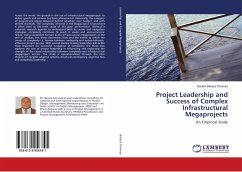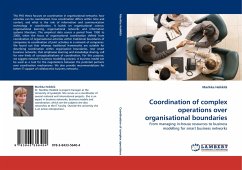
Project Leadership and Success of Complex Infrastructural Megaprojects
An Empirical Study
Versandkostenfrei!
Versandfertig in 6-10 Tagen
51,99 €
inkl. MwSt.

PAYBACK Punkte
26 °P sammeln!
Across the world, the growth in the use of infrastructural megaprojects to deliver goods and services has been phenomenal. Historically, this category of projects are always delivered behind schedule, over budget, and with benefit shortfalls. The complexity inherent in the megaproject environment is often cited as the main cause of this poor performance. Without a coherent research agenda to understand both its causes and navigation strategies, complexity continues to result in waste and socio-economic failure. Using completed Kenyan public infrastructural megaprojects as the unit of analysis,...
Across the world, the growth in the use of infrastructural megaprojects to deliver goods and services has been phenomenal. Historically, this category of projects are always delivered behind schedule, over budget, and with benefit shortfalls. The complexity inherent in the megaproject environment is often cited as the main cause of this poor performance. Without a coherent research agenda to understand both its causes and navigation strategies, complexity continues to result in waste and socio-economic failure. Using completed Kenyan public infrastructural megaprojects as the unit of analysis, this thesis determines how and the extent to which the causes of complexity i.e. human behavior, ambiguity and system behavior, influence project success. With several studies ranking leadership skill as the most important for successful navigation of complexity, the thesis also explores the role of project leadership in influencing and explaining the strength of the causal relationship between complexity and infrastructural megaproject success. The study is operationalized through the core theories of complex adaptive systems, structural contingency, cognitive bias and complexity leadership












